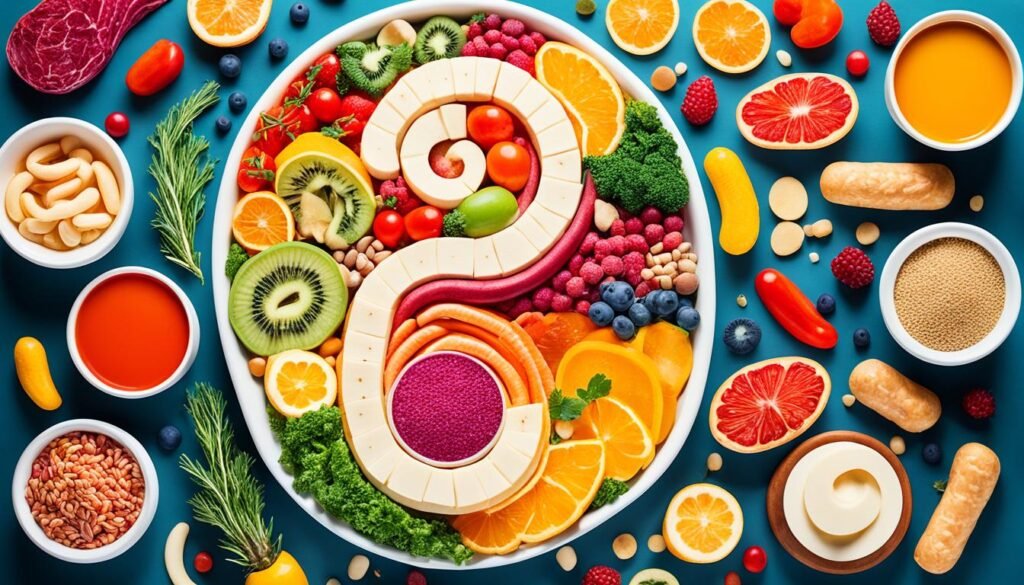Keeping your gut healthy is key to feeling good overall. This guide will show you how diet affects gut health. It offers tips and strategies to boost your digestive wellness. If you often have stomach problems or want to improve your gut, this article is for you.
We’ll talk about the gut microbiome and how to eat foods high in fiber and anti-inflammatory. You’ll learn about probiotics and how to keep your gut balanced. We’ll also look at how your gut and brain are connected. By the end, you’ll know how to support a healthy gut and improve your overall health.
Table of Contents
ToggleKey Takeaways
- Explore the connection between gut health and diet
- Learn about the importance of the gut microbiome and its role in overall health
- Discover the benefits of incorporating probiotics, fiber-rich, and anti-inflammatory foods into your diet
- Understand the importance of maintaining microbiome balance and the role of digestive enzymes
- Explore the gut-brain connection and the impact of stress on digestive health
Start this journey to better gut health and discover a new level of digestive wellness. Let’s explore the secrets to a happier, healthier gut together.
Understanding the Importance of Gut Health
Gut health is key to our overall health. It’s filled with trillions of microorganisms that help our bodies work right. These microbes are crucial for staying healthy.
The Gut Microbiome and Its Role
The gut microbiome does many important jobs. It helps us absorb nutrients, works on our metabolism, and keeps our immune system strong. It even affects our mood and how well we think. Having a diverse gut microbiome is key to staying healthy.
Signs of an Unhealthy Gut
When the gut microbiome is off balance, health problems can arise. This includes Leaky Gut Syndrome. Signs of an unhealthy gut are digestive issues, chronic inflammation, food intolerances, and mood changes. Fixing these problems is vital for good health.
“A healthy gut is the foundation for a healthy body and mind.”
Knowing about gut health and the gut microbiome is the first step to better health. By fixing gut issues, we can support a healthy Gut Microbiome. This helps us stay well for a long time.
Gut Health and Diet Tips: Probiotics for a Balanced Gut
Keeping your gut healthy is key to feeling good overall. Probiotics are the good bacteria in our gut that help balance our gut microbiome. Adding probiotics to your diet supports a healthy gut and brings many health benefits.
Probiotics come in different forms, each with special benefits. For example, Lactobacillus helps with lactose digestion, and Bifidobacterium can ease IBS symptoms. Eating foods like yogurt, kefir, and fermented veggies can help grow a strong gut microbiome.
“Probiotics are the key to a healthy gut, and a healthy gut is the foundation for overall well-being.” – Nutrition Expert, Jane Doe
Probiotic supplements are another way to boost gut health. When picking a supplement, choose one with various strains that fits your needs, like digestive or immune support.
A balanced gut microbiome is crucial for absorbing nutrients, a strong immune system, and good mental health. Adding probiotics to your diet is a step towards better gut health and supporting your body’s natural strength.
Fiber-Rich Foods: Fuel for a Healthy Gut
Fiber-rich foods are key for a balanced gut microbiome. They feed the good bacteria in your gut, boosting your overall health. Let’s look at how whole grains, vegetables, fruits, and legumes help your gut.
Whole Grains and Vegetables
Whole grains like brown rice, quinoa, and whole wheat are great for your gut. They’re hard to digest and end up feeding the good bacteria in your lower intestine. Eating them with veggies like leafy greens, broccoli, and carrots makes meals rich in fiber.
Fruits and Legumes
Fruits like berries, apples, and pears are full of soluble fiber. This fiber helps with digestion and keeps your gut healthy. Legumes, including beans, lentils, and chickpeas, are also high in fiber. Adding these foods to your meals supports your gut’s balance and diversity.
| Fiber-Rich Food | Fiber Content (per serving) |
|---|---|
| Whole Wheat Bread | 3 grams |
| Broccoli | 2.4 grams |
| Pears | 5.5 grams |
| Lentils | 7.8 grams |
Eating a mix of fiber-rich foods helps feed your gut and supports a healthy microbiome. This improves your digestion and overall well-being.

Anti-Inflammatory Diet for Gut Healing
An anti-inflammatory diet is great for gut health and digestive wellness. It focuses on whole foods, healthy fats, and spices that fight inflammation. These foods help make your gut healthier and balance your microbiome.
Key principles of an anti-inflammatory diet for gut healing include:
- Emphasize whole, minimally processed foods, such as fruits, vegetables, whole grains, and lean proteins.
- Incorporate healthy fats, such as those found in avocados, nuts, seeds, and fatty fish.
- Incorporate anti-inflammatory spices and herbs, like turmeric, ginger, and garlic, which can help calm inflammation in the gut.
- Limit or avoid processed foods, refined carbohydrates, and added sugars, which can exacerbate gut inflammation.
Following this diet helps heal your gut and ease digestive issues. It makes your gut healthier and boosts overall well-being by lowering body-wide inflammation.
| Anti-Inflammatory Foods | Foods to Limit |
|---|---|
|
|
Adding an anti-inflammatory diet to your life helps support your gut and digestive health.
Maintaining Microbiome Balance
Keeping your gut microbiome balanced is key for good digestive health. This part talks about ways to keep your microbiome balance. It covers eating prebiotic-rich foods and using prebiotic supplements.
Prebiotic Foods and Supplements
Prebiotics feed the good bacteria in your gut. They help keep your microbiome healthy and diverse. This is important for gut healing and staying well. Here are some tips to add prebiotics to your gut health and diet tips:
- Eat a mix of prebiotic-rich foods like onions, garlic, bananas, whole grains, and legumes.
- Think about taking a prebiotic supplement for more fiber.
- Pair prebiotic-rich foods with probiotic-rich foods, like yogurt or kefir, for better microbiome balance.
Adding prebiotics to your gut health and diet helps the good bacteria in your gut grow and become more diverse. This leads to better digestive wellness and overall health.
“Maintaining a healthy, balanced gut microbiome is one of the most important steps you can take for your overall well-being.”
The Role of Digestive Enzymes
Keeping our gut healthy is key to feeling good overall. Digestive enzymes are vital for this. They break down the food we eat, making it easier for our bodies to get the nutrients we need.
Our pancreas, liver, and small intestine make digestive enzymes. They work on different parts of our food like proteins, carbs, and fats. This helps our bodies get the most from what we eat.
When we have enough digestive enzymes, we absorb nutrients better, feel less bloated, and have a healthier gut. But, stress, getting older, and some health issues can lower enzyme levels. This can cause digestive problems.
| Digestive Enzyme | Primary Function |
|---|---|
| Amylase | Breaks down carbohydrates into smaller sugars |
| Lipase | Facilitates the digestion and absorption of fats |
| Protease | Assists in the breakdown of proteins into amino acids |
| Lactase | Helps digest the lactose found in dairy products |
Learning about digestive enzymes and using Digestive Enzymes, Gut Health and Diet Tips, and Gut Healing can help your gut work better. This supports your overall health.

“Digestive enzymes are the unsung heroes of a healthy gut, working tirelessly to ensure we can extract the most nutrients from our food.”
Fermented Foods: A Gut-Friendly Approach
Fermented foods are great for a healthy gut. They include things like yogurt, kefir, and kombucha. These foods are full of probiotics. They help put good bacteria back into your gut, which is good for digestion, reduces inflammation, and makes your gut healthier.
Yogurt, Kefir, and Kombucha
Yogurt is a staple in many cultures. It’s full of live cultures that help balance your gut bacteria. Kefir is a fermented milk drink that’s also high in probiotics. It helps with digestion and gut health. Kombucha, a fizzy fermented tea, is known for its probiotics and can help keep your gut healthy.
Adding these fermented foods to your meals is an easy way to boost your gut health and support your overall well-being. By choosing a gut-friendly approach and embracing the power of probiotics, you’re taking a step towards better digestive health.
“Fermented foods are a natural way to support a healthy gut and enhance overall well-being.”
Gut-Brain Connection: Managing Stress and Anxiety
The gut-brain connection is vital for our health. It links our gut and brain closely, affecting our mental health. This includes stress and anxiety. Knowing about this link helps keep our gut and mind in balance.
Stress and anxiety can harm our gut microbiome, the good and bad bacteria in our gut. High stress can upset the gut’s balance. This leads to digestive problems like bloating and pain.
- Stress can weaken the gut’s barrier, letting toxins into the bloodstream. This causes inflammation and worsens digestive issues.
- Anxiety changes how the gut processes food, causing discomfort and affecting nutrient absorption.
We can fight stress and anxiety by focusing on gut health and diet tips. Eating foods rich in probiotics, like yogurt and fermented veggies, helps balance gut bacteria. Foods high in fiber, such as whole grains and veggies, also support good gut microbes and reduce inflammation.
“A healthy gut is the foundation for a healthy mind. By nourishing our gut, we can unlock the power of the gut-brain connection and achieve greater mental well-being.”
By understanding the gut and brain’s link, we can manage stress and anxiety. This supports our overall health, both physical and mental.
Conclusion
In this guide, we’ve looked at key Gut Health and Diet Tips to help your Digestive Wellness. We talked about the gut microbiome, probiotics, fiber-rich foods, and anti-inflammatory diets. These tips give you the tools to support a healthier gut.
Keeping your gut balanced is key to feeling good overall. By focusing on digestive enzymes and the link between gut and brain, you can improve your digestive health. This leads to many benefits for your life. A healthy gut means a happy, nourished body, so keep exploring and adding these tips to your daily life.
This guide has shown how to ease digestive issues, boost your immune system, and improve your health. By following Gut Health and Diet Tips, you’re on your way to better Digestive Wellness.
FAQ
What is the importance of gut health?
Gut health is key for feeling good overall. It helps with absorbing nutrients and keeps the immune system strong. A healthy gut also stops bad bacteria from growing. This can make digestion better, reduce swelling, and help with mental health.
What are the signs of an unhealthy gut?
Signs of a bad gut include stomach problems, ongoing swelling, and leaky gut syndrome. These can show up as bloating, slow or fast bowel movements, and other stomach issues.
How can probiotics help with gut health?
Probiotics are good bacteria in foods and supplements that can fix the gut balance. They help with digestion, boost the immune system, and keep the gut healthy.
What are the best fiber-rich foods for gut health?
Foods like whole grains, veggies, fruits, and beans are full of fiber. They feed the good bacteria in your gut. This keeps your gut balanced and healthy.
How can an anti-inflammatory diet support gut healing?
An anti-inflammatory diet focuses on whole foods, healthy fats, and spices that fight inflammation. This can ease digestive problems and help your gut heal.
What is the role of prebiotic foods and supplements in maintaining microbiome balance?
Prebiotics are in foods and supplements and feed the good bacteria in your gut. Eating them helps your microbiome thrive, which is key for gut health and well-being.
How do digestive enzymes contribute to gut health?
Digestive enzymes break down and absorb nutrients, which is vital for a healthy gut. Having enough digestive enzymes helps with digestion, using nutrients well, and keeping your gut healthy.
What are the benefits of incorporating fermented foods into a gut-healthy diet?
Foods like yogurt, kefir, and kombucha are full of probiotics. Adding them to your diet can fill your gut with good bacteria. This improves digestion, lowers inflammation, and supports gut health.
How does the gut-brain connection impact mental well-being?
The link between the gut and brain is complex and important. Gut health affects mental health, as stress can harm the gut. Eating well and managing stress can help your mind and gut stay healthy.













